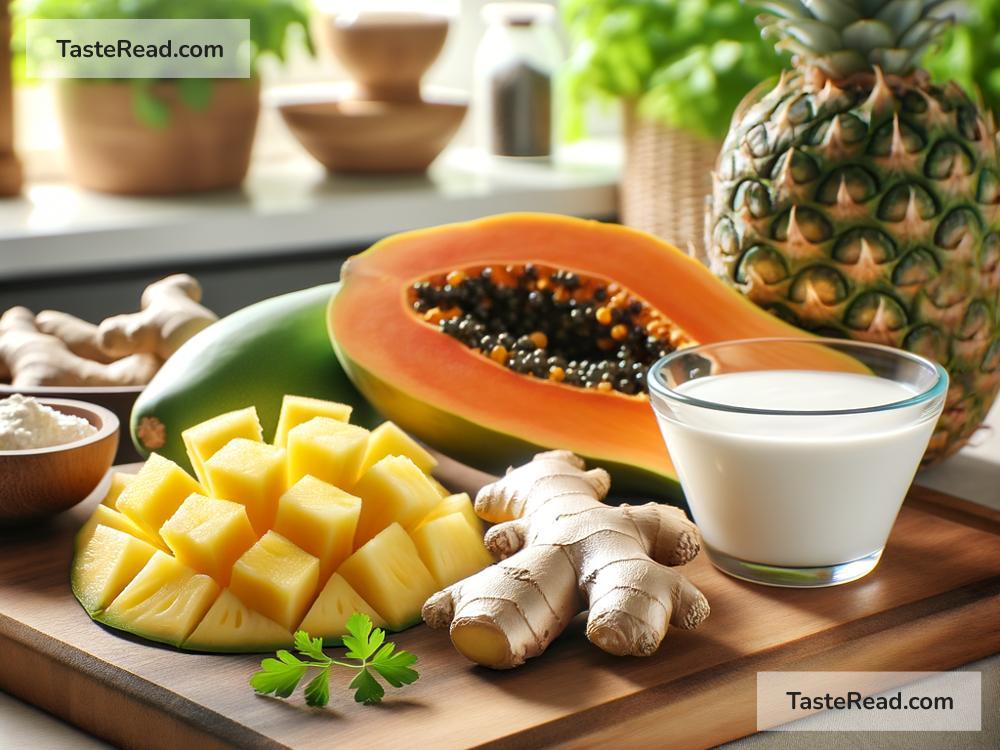Foods That Improve Digestive Enzyme Function
Digestive enzymes play a crucial role in our bodies. They are little helpers that break down the food we eat into smaller, absorbable nutrients. If your digestive enzymes aren’t functioning well, you may end up feeling bloated, tired, or uncomfortable after meals because your body struggles to break down food properly. Luckily, many foods can naturally boost the production and activity of digestive enzymes, helping your body process food more efficiently. Let’s explore some simple and tasty options to improve digestive enzyme function.
What Are Digestive Enzymes?
Digestive enzymes are proteins produced by the pancreas and other parts of the digestive system. Each enzyme has a specific job:
– Amylase helps break down carbohydrates.
– Protease works on proteins.
– Lipase helps digest fats.
Without enough of these enzymes, your body may struggle to extract the nutrients it needs from food. Incorporating enzyme-friendly foods into your diet can boost their activity and improve your digestion.
Foods That Boost Digestive Enzymes
Here is a list of foods that naturally enhance digestive enzyme function:
1. Pineapple
Pineapple is a tropical fruit packed with bromelain, a powerful enzyme that helps digest proteins. It works especially well for breaking down meat, fish, and dairy products. Eating some fresh pineapple as a snack or adding it to your meals can improve protein digestion.
How to eat it:
– Add pineapple chunks to a fruit salad.
– Blend it into a smoothie.
– Use fresh pineapple as a tenderizer for meats.
2. Papaya
Papaya contains papain, another enzyme that helps your body digest proteins more effectively. Papain is often used as a natural remedy for indigestion or bloating after eating heavy meals. Papaya is also rich in vitamins and antioxidants that support overall health.
How to eat it:
– Enjoy fresh papaya as a breakfast fruit.
– Mix it with yogurt for a healthy dessert.
– Use it in marinades for chicken or pork for easier digestion.
3. Ginger
Ginger isn’t technically an enzyme, but it stimulates the production of digestive enzymes in your body. It is particularly good for breaking down carbohydrates and proteins. Ginger also has anti-inflammatory properties that can soothe your stomach if you’re feeling nauseous or gassy.
How to eat it:
– Brew ginger tea.
– Grate it into soups or stir-fries.
– Add a pinch of fresh ginger to smoothies.
4. Fermented Foods
Fermented foods—like yogurt, kefir, sauerkraut, kimchi, and miso—contain probiotics (healthy bacteria) that aid digestion and boost enzyme production. Probiotics help balance your gut microbiome, making your digestive system work more efficiently.
How to eat it:
– Have a serving of yogurt or kefir regularly.
– Add sauerkraut or kimchi to sandwiches or salads.
– Use miso paste to make flavorful soups.
5. Bananas
Bananas are gentle on the stomach and contain natural enzymes that help break down carbohydrates. They are also a source of fiber, which promotes healthy digestion and keeps your system regular.
How to eat it:
– Grab a banana as a quick snack.
– Slice it on top of oatmeal or cereal.
– Blend it into a smoothie for a creamy texture.
6. Avocado
Avocado is rich in lipase, an enzyme that breaks down fats. If you’ve ever felt heavy or bloated after eating fatty foods, avocados can help ease digestion. They’re also loaded with healthy fats, vitamins, and fiber.
How to eat it:
– Spread avocado on toast.
– Mash it into guacamole.
– Slice it onto salads or tacos.
7. Honey
Raw honey (not the processed kind) contains enzymes like diastase and amylase, which help break down carbohydrates. It also has soothing effects on the stomach, making it a great choice for easing digestive discomfort.
How to eat it:
– Mix honey into herbal tea.
– Drizzle it over yogurt or oatmeal.
– Use it as a natural sweetener in smoothies or baked goods.
8. Apples
Apples contain both pectin (a type of fiber) and malic acid that support digestion and enzyme production. Eating apples regularly can improve gut health and help enzymes break down certain components of food more effectively.
How to eat it:
– Eat apples as a portable snack.
– Bake them with cinnamon for a healthy dessert.
– Add slices to salads for a sweet crunch.
9. Coconut
Coconut products, including fresh coconut, coconut milk, and coconut water, contain compounds that encourage the production of digestive enzymes. Coconut also has antimicrobial properties, which can promote gut health.
How to eat it:
– Sprinkle shredded coconut on yogurt or smoothies.
– Use coconut milk in curries or soups.
– Enjoy fresh coconut water as a refreshing drink.
Tips for Better Digestion
In addition to eating enzyme-supporting foods, other habits can help improve your digestion:
1. Chew your food thoroughly to start breaking it down before it reaches your stomach.
2. Stay hydrated to support enzyme activity and overall digestion.
3. Avoid overeating or eating too quickly, as it puts stress on your digestive system.
Final Thoughts
Digestive enzymes are essential for breaking down food and absorbing nutrients. When these enzymes aren’t working properly, it can lead to discomfort, bloating, and poor nutrient absorption. By adding foods like pineapple, papaya, ginger, and fermented products to your diet, you can naturally boost digestive enzyme function and improve your overall gut health. Eating a variety of these enzyme-friendly foods regularly will help your digestive system work smoothly, leaving you feeling energized and comfortable after meals.
Give your gut the care it deserves—and enjoy better digestion!


